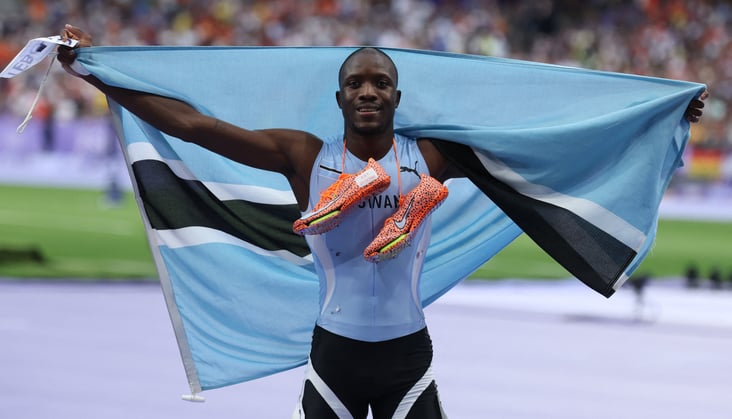
For a long time, the athletic prowess of East Africans, especially Kenyans and Ethiopians, was mainly associated with long-distance running. However, Southern Africans have recently ‘shattered expectations’ and exceeded continental sprinting potential with Letsile Tebogo. Tebogo was born in Kanye, Botswana, in 2003. His youthful competitions were a breeze owing to his incredible speed and cool demeanor, thus easily earning him the title of the eye-catcher. By 2023, he had already earned comparisons to legends like Usain Bolt — not just for his times, but for his charisma, fluid running style, and ability to peak in major events. His 2024 Olympic gold in the 100m was not just a personal victory; it marked Botswana’s first-ever Olympic title and shifted Africa’s sprint narrative in a new direction.
Global Spotlight and Historic PerformanceTebogo’s breakout moment came at the 2024 Paris Olympics, where he won gold in the men’s 100m final with a time of 9.85 seconds. In doing so, he became the first African-born athlete to win Olympic gold in the event since the modern era of sprinting began. His rise has sparked global attention, and platforms that follow top-tier athletic events, including those offering sprint-focused odds like create account in MelBet, have begun spotlighting African sprinters as serious contenders in global betting markets. Before achieving his Olympic gold, Tebogo already had quite an impressive achievement. He also won silver at the 2023 World Athletics Championships in Budapest, and in 2022, he became the first athlete to break the U20 world record two times. His composure, consistency, and technical finesse mark him not just as a breakout star but a long-term fixture in professional sprinting.
To fully understand Tebogo’s rapid rise, consider the following timeline of achievements and milestones that reflect both development and dominance:
Year | Competition | Result | Note |
2021 | World U20 Championships (Nairobi) | Gold in 100m & Silver in 200m | Introduced at global level |
2022 | World U20 Championships (Cali) | Broke U20 100m world record | Ran 9.91s, jogging last 10 meters |
2023 | World Championships (Budapest) | Silver in 100m & Bronze in 200m | First African male to medal in both sprints |
2024 | Paris Olympic Games | Gold in 100m | First Olympic champion from Botswana |
Tebogo's most prominent traits go beyond speed; his sharpened race intelligence and mental composure are also key assets, albeit uncommon for sprinters of his age. His rising accomplishment in the 100m and 200m races further indicates versatility, while he contemplates the prospects of becoming a world record holder for both in the years to come.
Technical Precision and Sprinting StyleTebogo’s sprinting technique is widely praised by coaches and analysts alike. He has a low starting angle paired with high turnover rate and low deceleration for the last 40 meters. Unlike many junior sprinters, he doesn’t overstride or rely solely on power — his stride is compact, efficient, and timed to perfection.
Key characteristics of his sprinting include:
Explosive first 30 meters without wasted motion
Upright form with low vertical oscillation
Relaxed shoulders and open chest posture
Late-phase acceleration, especially useful in 200m
Strategic lane management in curved starts
This foundation has helped him avoid common injury patterns and improve steadily without radical changes to his running mechanics — an advantage as he transitions into peak senior-level competitions.
Regional Impact and Youth InspirationTebogo’s success has had ripple effects across Botswana and Southern Africa. As of 2022, athletics clubs in Gaborone, Francistown, and Maun are witnessing a surge in young registrants. Currently, both government and private sponsors are investing heavily into the construction of artificial athletics tracks, training schools, sponsoring coaches, and entering partnerships with other educational institutions all in the hope of finding Toby's successor..
Botswana Athletics Association (BAA) has established national training centers based on Tebogo’s model which emphasize biomechanics, nutrition, and mental conditioning. The goal is to begin cultivating sprinters at younger age and keep them within elite retention pathways. In the meantime, media outlets in the region, including those with live betting options such as the MelBet app, are now broadcasting sprinting events with the fervor previously reserved for soccer.
National recognition and the international stature of these countries is now changing Southern African countries perception on sprinting. It is no longer regarded as a niche sport but a source of pride for the nation.
Professionalism and Commercial Presence
Tebogo has also positioned himself as a marketable athlete. Fluent in English and Setswana, he engages easily with international media and carries himself with calm confidence. Major brands in sports apparel, mobile tech, and banking have expressed interest in ambassador deals, and his clean public image appeals to sponsors looking for long-term partnerships.
His digital strategy includes targeted social media content, behind-the-scenes race prep, and community outreach — all built to humanize his persona while amplifying visibility. Unlike earlier generations of African sprinters who were underrepresented in global advertising, Tebogo is at the center of a new model where performance meets branding infrastructure.
What Sets Tebogo Apart in Global SprintingThe global sprinting field remains competitive, with athletes from the U.S., Jamaica, and Europe regularly posting sub-10-second times. Yet what makes Tebogo unique is his composure, his mental sharpness in finals, and his ability to improve under pressure. While many young sprinters peak too early, Tebogo has followed a controlled development arc.
In addition to athletic excellence, his team includes physiologists, recovery specialists, and sport psychologists — a structure more common in global sprinting powerhouses. This holistic approach has allowed him to compete at the highest level while avoiding burnout or overtraining.
His stated long-term goal is not just to remain on top but to break the 100m world record — a goal he approaches with calm, data-driven planning rather than media hype.

